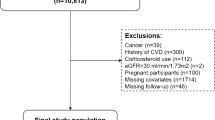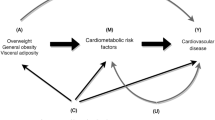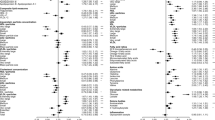Abstract
Background:
The severity of the metabolic syndrome (MetS) is related to future incidence of type 2 diabetes (T2DM) and cardiovascular disease (CVD). However, the relationship between MetS severity and levels of fasting insulin and adiponectin—markers of insulin resistance—is unclear.
Methods:
We used linear and logistic regression to analyze data from 711 participants of the Princeton Lipid Research Cohort with information regarding levels of insulin, adiponectin and MetS severity during 1998–2003 (mean age 39.5 years); 595 participants had MetS severity data from childhood (1973–1976, mean age 12.9 years) and 417 had updated disease status from 2010 to 2014 (mean age 50.9 years).
Results:
Childhood MetS Z-scores were positively associated with adult insulin levels (P<0.001) and negatively associated with adiponectin levels (P=0.01). In individual analyses, higher insulin levels and MetS Z-score as adults were related to higher odds of incident diabetes and CVD over the next 11.2 years (all P<0.001), whereas lower adiponectin levels were only related to odds of future T2DM (P<0.0001). In a model including insulin, adiponectin and MetS Z-score, adiponectin was not linked to future disease; both insulin (P=0.027) and MetS Z-score (P=0.002) were related to risk of future T2DM, while only MetS Z-score was related to future CVD (P<0.001).
Conclusions:
The severity of MetS exhibits long-term links to levels of insulin and adiponectin, suggesting potential genetic and environmental influences on insulin resistance over time. As a long-term predictor of T2DM and CVD, the severity of MetS exhibited consistent independent correlations. This supports clinical utility in evaluating MetS severity as a predictor of risk for future disease.
This is a preview of subscription content, access via your institution
Access options
Subscribe to this journal
Receive 12 print issues and online access
$259.00 per year
only $21.58 per issue
Buy this article
- Purchase on Springer Link
- Instant access to full article PDF
Prices may be subject to local taxes which are calculated during checkout


Similar content being viewed by others
References
Kahn SE, Hull RL, Utzschneider KM . Mechanisms linking obesity to insulin resistance and type 2 diabetes. Nature 2006; 444: 840–846.
Reaven GM . Banting lecture 1988. Role of insulin resistance in human disease. Diabetes 1988; 37: 1595–1607.
de Ferranti S, Mozaffarian D . The perfect storm: obesity, adipocyte dysfunction, and metabolic consequences. Clin Chem 2008; 54: 945–955.
DeBoer MD . Obesity, systemic inflammation, and increased risk for cardiovascular disease and diabetes among adolescents: a need for screening tools to target interventions. Nutrition 2013; 29: 379–386.
Yamauchi T, Kamon J, Waki H, Terauchi Y, Kubota N, Hara K et al. The fat-derived hormone adiponectin reverses insulin resistance associated with both lipoatrophy and obesity. Nat Med 2001; 7: 941–946.
Kadowaki T, Yamauchi T, Kubota N, Hara K, Ueki K, Tobe K . Adiponectin and adiponectin receptors in insulin resistance, diabetes, and the metabolic syndrome. J Clin Invest 2006; 116: 1784–1792.
Li S, Shin HJ, Ding EL, van Dam RM . Adiponectin levels and risk of type 2 diabetes: a systematic review and meta-analysis. JAMA 2009; 302: 179–188.
Pischon T, Girman CJ, Hotamisligil GS, Rifai N, Hu FB, Rimm EB . Plasma adiponectin levels and risk of myocardial infarction in men. JAMA 2004; 291: 1730–1737.
Sattar N, Wannamethee G, Sarwar N, Tchernova J, Cherry L, Wallace AM et al. Adiponectin and coronary heart disease: a prospective study and meta-analysis. Circulation 2006; 114: 623–629.
Kanhai DA, Kranendonk ME, Uiterwaal CS, van der Graaf Y, Kappelle LJ, Visseren FL . Adiponectin and incident coronary heart disease and stroke. A systematic review and meta-analysis of prospective studies. Obes Rev 2013; 14: 555–567.
Grundy SM, Cleeman JI, Daniels SR, Donato KA, Eckel RH, Franklin BA et al. Diagnosis and management of the metabolic syndrome - An American Heart Association/National Heart, Lung, and Blood Institute Scientific Statement. Circulation 2005; 112: 2735–2752.
Walker SE, Gurka MJ, Oliver MN, Johns DW, DeBoer MD . Racial/ethnic discrepancies in the metabolic syndrome begin in childhood and persist after adjustment for environmental factors. Nutr Metab Cardiovasc Dis 2012; 22: 141–148.
Sumner AE . Ethnic differences in triglyceride levels and high-density lipoprotein lead to underdiagnosis of the metabolic syndrome in black children and adults. J Pediatr 2009; 155: e7–e11.
Gurka MJ, Ice CL, Sun SS, DeBoer MD . A confirmatory factor analysis of the metabolic syndrome in adolescents: an examination of sex and racial/ethnic differences. Cardiovasc Diabetol 2012; 11: 128.
Gurka MJ, Lilly CL, Norman OM, DeBoer MD . An examination of sex and racial/ethnic differences in the metabolic syndrome among adults: a confirmatory factor analysis and a resulting continuous severity score. Metabolism 2014; 63: 218–225.
DeBoer MD, Gurka MJ, Woo JG, Morrison JA . Severity of the metabolic syndrome as a predictor of type 2 diabetes between childhood and adulthood: the Princeton Lipid Research Cohort Study. Diabetologia 2015; 58: 2745–2752.
DeBoer MD, Gurka MJ, Woo JG, Morrison JA . Severity of metabolic syndrome as a predictor of cardiovascular disease between childhood and adulthood: the Princeton Lipid Research Cohort Study. J Am Coll Cardiol 2015; 66: 755–757.
Ford ES, Giles WH . A comparison of the prevalence of the metabolic syndrome using two proposed definitions. Diabetes Care 2003; 26: 575–581.
Hunt KJ, Resendez RG, Williams K, Haffner SM, Stern MP . National Cholesterol Education Program versus World Health Organization metabolic syndrome in relation to all-cause and cardiovascular mortality in the San Antonio Heart Study. Circulation 2004; 110: 1251–1257.
Kim JY, Ahn SV, Yoon JH, Koh SB, Yoon J, Yoo BS et al. Prospective study of serum adiponectin and incident metabolic syndrome: the ARIRANG study. Diabetes Care 2013; 36: 1547–1553.
Kynde I, Heitmann BL, Bygbjerg IC, Andersen LB, Helge JW . Hypoadiponectinemia in overweight children contributes to a negative metabolic risk profile 6 years later. Metabolism 2009; 58: 1817–1824.
Morrison J, Degroot I, Kelly K, Mellies M, Glueck CJ . Parent-child associations - cholesterol and triglyceride. Circulation 1977; 56: 20–20.
Woo JG, Morrison JA, Stroop DM, Aronson Friedman L, Martin LJ . Genetic architecture of lipid traits changes over time and differs by race: Princeton Lipid Follow-up Study. J Lipid Res 2014; 55: 1515–1524.
Morrison JA, Friedman LA, Wang P, Glueck CJ . Metabolic syndrome in childhood predicts adult metabolic syndrome and type 2 diabetes mellitus 25 to 30 years later. J Pediatr 2008; 152: 201–206.
Laskarzewski P, Morrison JA, Mellies MJ, Kelly K, Gartside PS, Khoury P et al. Relationships of measurements of body-mass to plasma-lipoproteins in school-children and adults. Am J Epidemiol 1980; 111: 395–406.
Ford ES, Li C, Cook S, Choi HK . Serum concentrations of uric acid and the metabolic syndrome among US children and adolescents. Circulation 2007; 115: 2526–2532.
National High Blood Pressure Education Program Working Group on High Blood Pressure in Children and Adolescents. The fourth report on the diagnosis, evaluation, and treatment of high blood pressure in children and adolescents. Pediatrics 2004; 114 (2 Suppl 4th Report) 555–576.
Gurka MJ, Lilly CL, Oliver MN, DeBoer MD . An examination of sex and racial/ethnic differences in the metabolic syndrome among adults: a confirmatory factor analysis and a resulting continuous severity score. Metabolism 2014; 63: 218–225.
Defronzo RA . Banting Lecture. From the triumvirate to the ominous octet: a new paradigm for the treatment of type 2 diabetes mellitus. Diabetes 2009; 58: 773–795.
McNeill AM, Schmidt MI, Rosamond WD, East HE, Girman CJ, Ballantyne CM et al. The metabolic syndrome and 11-year risk of incident cardiovascular disease in the atherosclerosis risk in communities study. Diabetes Care 2005; 28: 385–390.
Malik S, Wong ND, Franklin SS, Kamath TV, L'Italien GJ, Pio JR et al. Impact of the metabolic syndrome on mortality from coronary heart disease, cardiovascular disease, and all causes in United States adults. Circulation 2004; 110: 1245–1250.
Vishnu A, Gurka MJ, DeBoer MD . The severity of the metabolic syndrome increases over time within individuals, independent of baseline metabolic syndrome status and medication use: the Atherosclerosis Risk in Communities Study. Atherosclerosis 2015; 243: 278–285.
DeBoer MD, Gurka MJ . Ability among adolescents for the metabolic syndrome to predict elevations in factors associated with type 2 diabetes and cardiovascular disease: data from the national health and nutrition examination survey 1999-2006. Metab Syndr Relat Disord 2010; 8: 343–353.
Aguilar-Salinas CA, Garcia EG, Robles L, Riano D, Ruiz-Gomez DG, Garcia-Ulloa AC et al. High adiponectin concentrations are associated with the metabolically healthy obese phenotype. J Clin Endocrinol Metab 2008; 93: 4075–4079.
Morrison JA, Glueck CJ, Daniels S, Wang P, Stroop D . Paradoxically high adiponectin in obese 16-year-old girls protects against appearance of the metabolic syndrome and its components seven years later. J Pediatr 2011; 158: 208–214 e1.
Martin BC, Warram JH, Krolewski AS, Bergman RN, Soeldner JS, Kahn CR . Role of glucose and insulin resistance in development of type 2 diabetes mellitus: results of a 25-year follow-up study. Lancet 1992; 340: 925–929.
Ruige JB, Assendelft WJ, Dekker JM, Kostense PJ, Heine RJ, Bouter LM . Insulin and risk of cardiovascular disease: a meta-analysis. Circulation 1998; 97: 996–1001.
Abdul-Ghani MA, Williams K, DeFronzo RA, Stern M . What is the best predictor of future type 2 diabetes? Diabetes Care 2007; 30: 1544–1548.
Knowler WC, Barrett-Connor E, Fowler SE, Hamman RF, Lachin JM, Walker EA et al. Reduction in the incidence of type 2 diabetes with lifestyle intervention or metformin. N Engl J Med 2002; 346: 393–403.
Hara K, Horikoshi M, Yamauchi T, Yago H, Miyazaki O, Ebinuma H et al. Measurement of the high-molecular weight form of adiponectin in plasma is useful for the prediction of insulin resistance and metabolic syndrome. Diabetes Care 2006; 29: 1357–1362.
Heidemann C, Sun Q, van Dam RM, Meigs JB, Zhang C, Tworoger SS et al. Total and high-molecular-weight adiponectin and resistin in relation to the risk for type 2 diabetes in women. Ann Intern Med 2008; 149: 307–316.
Acknowledgements
This work was supported by NIH grants 1R21DK085363 (MJG and MDD), 1R01HL120960 (MJG and MDD), 5K08HD060739 (MDD) and NHLBI N01HV22914; a UVa Children’s Hospital Grant-in-Aid (MDD); a CCHMC Heart Institute Research Core grant; a Schmidlapp Women’s Scholar’s Award (JGW); and American Heart Association grant 9750129 (JAM).
Author contributions
MDD, MJG, JGW and JAM designed the study. JGW and JAM oversaw participant recruitment and data collection. MDD and MJG planned the analysis and wrote the manuscript. MJG performed the analysis. MDD is the guarantor of this work and had full access to the data in the study and takes final responsibility for the decision to submit for publication. All authors have read and given final approval of the manuscript.
Author information
Authors and Affiliations
Corresponding author
Ethics declarations
Competing interests
The authors declare no conflict of interest.
Rights and permissions
About this article
Cite this article
DeBoer, M., Gurka, M., Morrison, J. et al. Inter-relationships between the severity of metabolic syndrome, insulin and adiponectin and their relationship to future type 2 diabetes and cardiovascular disease. Int J Obes 40, 1353–1359 (2016). https://doi.org/10.1038/ijo.2016.81
Received:
Revised:
Accepted:
Published:
Issue Date:
DOI: https://doi.org/10.1038/ijo.2016.81
This article is cited by
-
Association of metabolic syndrome with cardiovascular outcomes in hypertensive patients: a systematic review and meta-analysis
Journal of Endocrinological Investigation (2021)
-
Fetuin-a to adiponectin ratio is a sensitive indicator for evaluating metabolic syndrome in the elderly
Lipids in Health and Disease (2020)
-
Metabolic syndrome severity is significantly associated with future coronary heart disease in Type 2 diabetes
Cardiovascular Diabetology (2018)
-
Assessing the added predictive ability of a metabolic syndrome severity score in predicting incident cardiovascular disease and type 2 diabetes: the Atherosclerosis Risk in Communities Study and Jackson Heart Study
Diabetology & Metabolic Syndrome (2018)
-
Geographical variation in the prevalence of obesity, metabolic syndrome, and diabetes among US adults
Nutrition & Diabetes (2018)



